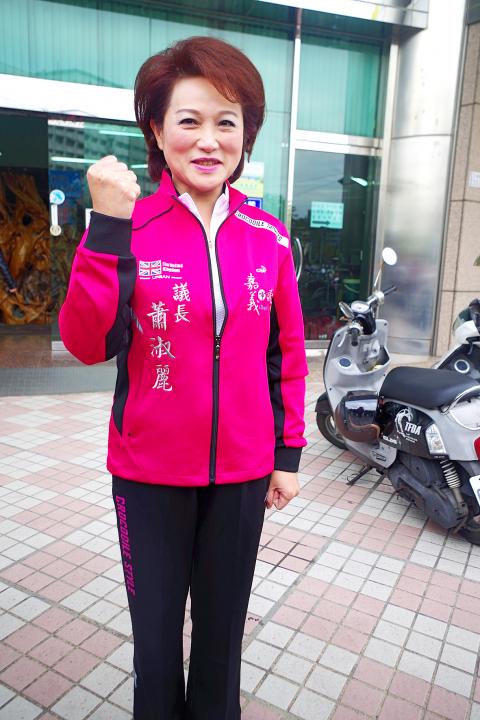Chinese Nationalist Party (KMT) Chiayi City Council Speaker Hsiao Shu-li (蕭淑麗) yesterday announced that she would run as an independent for the Chiayi mayoral post later this year, saying she did not trust the KMT’s poll-based primary.
Hsiao said she forsook her supporters three years ago by not completing her bid for mayor and did not want to let history repeat itself.
“I hope my bid will not be determined by the party, but by public opinion,” Hsiao told a news conference in Chiayi, adding that a political party should be like-minded people jointly fighting for people’s happiness and best interests.

Photo: Taipei Times
In March 2014, eight months before the local nine-in-one elections, Hsiao also said she would withdraw from the KMT and run as an independent candidate.
She dropped out of the race in July that year.
Hsiao rejoined the KMT in late 2014 after winning a city councilor seat as an independent.
Twu Shiing-jer (涂醒哲), the Democratic Progressive Party candidate, won the mayoral post, defeating the KMT candidate, former National Youth Commission minister Chen Yi-chen (陳以真), by only 8,590 votes.
Hsiao said she started mulling quitting the party again after former Chiayi mayor Huang Min-hui (黃敏惠) announced her bid for the mayoral post at an event also attended by KMT Chairman Wu Den-yih (吳敦義) on Saturday last week.
“Such a coincidence has caused grievance among my supporters,” Hsiao said.
KMT Culture and Communications Committee deputy director-general Hung Meng-kai (洪孟楷) said the party still hoped that all aspiring candidates could return to the party’s primary mechanism.
Asked whether Hsiao notified party headquarters before her announcement, Hung did not answer directly, but said only that the KMT has a good grasp of the situation.
At press time last night, the KMT’s local branch had yet to receive Hsiao’s application for membership withdrawal.

A Taiwanese software developer has created a generative artificial intelligence (AI) model to help people use AI without exposing sensitive data, project head Huang Chung-hsiao (黃崇校) said yesterday. Huang, a 55-year-old coder leading a US-based team, said that concerns over data privacy and security in popular generative AIs such as ChatGPT and DeepSeek motivated him to develop a personal AI assistant named “Mei.” One of the biggest security flaws with cloud-based algorithms is that users are required to hand over personal information to access the service, giving developers the opportunity to mine user data, he said. For this reason, many government agencies and

The National Fire Agency on Thursday said a series of drills simulating a magnitude 8.5 earthquake would be held in September to enhance the government’s emergency response capabilities. Since earthquakes cannot be predicted, only by continuously promoting disaster prevention measures could Taiwan enhance its resilience to earthquakes, agency Director-General Hsiao Huan-chang (蕭煥章) said in a news release. The exercises would be held to mark annual National Disaster Prevention Day on Sept. 21, the aim of which is to test Taiwan’s preparedness and improve its earthquake resilience in case of a major temblor, Hsiao said. As part of those drills, an earthquake alert would

DEFENSE: The National Security Bureau promised to expand communication and intelligence cooperation with global partners and enhance its strategic analytical skills China has not only increased military exercises and “gray zone” tactics against Taiwan this year, but also continues to recruit military personnel for espionage, the National Security Bureau (NSB) said yesterday in a report to the Legislative Yuan. The bureau submitted the report ahead of NSB Director-General Tsai Ming-yen’s (蔡明彥) appearance before the Foreign and National Defense Committee today. Last year, the Chinese People’s Liberation Army (PLA) conducted “Joint Sword-2024A and B” military exercises targeting Taiwan and carried out 40 combat readiness patrols, the bureau said. In addition, Chinese military aircraft entered Taiwan’s airspace 3,070 times last year, up about

STRICTER ENFORCEMENT: Taipei authorities warned against drunk cycling after a sharp rise in riding under the influence, urging greater public awareness of its illegality Taipei authorities have issued a public warning urging people not to ride bicycles after consuming alcohol, following a sharp rise in riding under the influence (DUI) cases involving bicycles. Five hundred and seven people were charged with DUI last year while riding YouBikes, personal bicycles, or other self-propelled two-wheelers — a fourfold increase from the previous year, data released by the Taipei Police Department’s Traffic Division showed. Of these, 33 cases were considered severe enough to be prosecuted under “offenses against public safety,” the data showed. Under the Road Traffic Management and Penalty Act (道路交通管理處罰條例), bicycles — including YouBikes and other